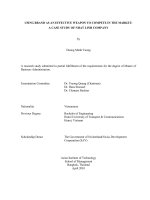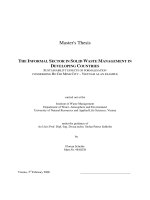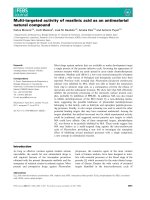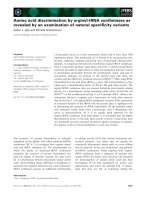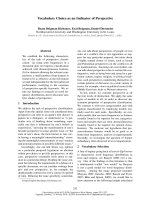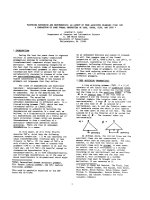Emotions as an aspect of respect among adolescents
Bạn đang xem bản rút gọn của tài liệu. Xem và tải ngay bản đầy đủ của tài liệu tại đây (247.54 KB, 7 trang )
Int.J.Curr.Microbiol.App.Sci (2019) 8(10): 755-761
International Journal of Current Microbiology and Applied Sciences
ISSN: 2319-7706 Volume 8 Number 10 (2019)
Journal homepage:
Original Research Article
/>
Emotions as an Aspect of Respect among Adolescents
Priyanka Panwar*
Department of Human Development and Childhood Studies, Lady Irwin College,
University of Delhi, New Delhi, India
*Corresponding author
ABSTRACT
Keywords
Adolescent,
Respect, Emotion,
Feelings, Empathy,
Fear, Reciprocity
Article Info
Accepted:
07 September 2019
Available Online:
10 October 2019
Adolescence is a period which is marked by various changes and challenges in
adolescents‟ life. The adolescents‟ approaches in dealing with those challenges are
primarily influenced by their behavior which depends upon their emotions. Each
and every individual is distinctive in their behavioral characteristics which mean
that they have different feelings and emotions. The respect for every individual‟s
feelings is important in order to maintain a healthy relationship and environment.
Respecting someone‟s emotions implies that the person is valued and
acknowledged. So, the present study was designed to study various emotions that
are associated with respect. For this purpose, 50 school going adolescents in the
age group of 14-15 years were selected from Sikandra Road, New Delhi, India.
The tools used in this study were vignettes, interview schedule and observation.
The major findings of the study were that emotions like happy, content, proud,
anger, guilt, remorse and shame are felt when a person is respected or
disrespected. Respect as a result of fear of authority was also discovered in the
study. It was revealed that love and fear were the core emotions that drive the
display of respect. There is always a give and take of something which is also
observed in case of respect.
Introduction
Respect is central for a person living in a civil
society and critical to constructive human
relations (Shwalb and Shwalb, 2006). Respect
is considered as positive and necessary which
indicates that it is important for valuing people
and things. Respect means to treat a person or
thing with care and concern (Shwalb and
Shwalb, 2006). Respect is shown to others by
giving them realistic positive consideration,
acknowledging them, listening with careful
attention and providing suitable gratitude
(Lawrence-Lightfoot, 2000).
The word „respect is originated from Latin remeaning „again‟ and specere meaning „to
look‟, which means „to look again‟ or to
notice with attention‟. The opposite word for
respect is disrespect. Disrespecting someone
755
Int.J.Curr.Microbiol.App.Sci (2019) 8(10): 755-761
simply means to insult or humiliate a person
(Lawrence-Lightfoot, 2000). According to Hill
(2000), an individual should be respected as
he/she has a rational nature, so they should be
respected like other things of remarkable value
and consequently protected and appreciated.
Every human being is unique in his/her nature
and have different feelings, and behaviours.
So, it becomes important to understand others
feelings and have respect for the feelings of
others. Respect for feelings of other people
helps in encouraging them to express their
emotions and experiences which strengthen
their bond.
Materials and Methods
Locale
The participants of the current study were
collected from Sikandra Road, New Delhi,
India.
Sample size
The sample for the study consisted of 50
school going adolescents in the age group of
14-15 years. An equal number of boys (n1=
25) and girls (n2= 25) were selected for the
study.
Perspective on respect as an emotion
Sample selection
Kant gave two concept of respect as an
emotion: firstly, respect is the only emotion
that has an association with cognition, and
secondly, respect is the only emotion that aids
as an enticement for morally praiseworthy
deed.Kant believed that emotions in respect
are a class of feelings which can be positive or
negative. Respect as a positive feeling has
moral commands which guide us to do
virtuous things and as a negative feeling
which produces pain and humiliation by doing
wrong deeds (Drummond, 2006).
Using a purposive sampling technique, the
investigator selected a sample of 50
adolescents who fulfilled the criterion of the
research.
Adolescence is a period manifested by
changes in moral thinking and behavior which
gets swayed by emotions (Reed& Ham, 1993).
There is a growing pressure among
adolescents and in order to deal with these
challenges an enormous kind of emotions
occur. Learning to cope with all those
emotions entails that adolescents learn to
differentiate how and when emotions are
efficient from ways in which they can turn out
to be negative for development, and have
dysfunctional consequences (Larson, Clore
and Wood, 1999). Consequently, the present
study aims to study the emotions that are
associated with respect among adolescents.
Procedure for data collection
For the present study, every willing participant
was given written consent form to be duly
signed by their parents for allowing their child
to participate in the study. After receiving the
consent, the participants were informed about
the research area and information to be
obtained from them. Right to anonymity and
right to privacy were maintained in the
research and names have been changed to
prevent their identity.
For the data analysis, content analysis was
done to identify the themes and patterns in the
results obtained.
Research instruments
Keeping in mind the objective of the present
study, the tools were framed in English and
Hindi for easy and clear interactions in
meetings
with
participants.
Multiple
756
Int.J.Curr.Microbiol.App.Sci (2019) 8(10): 755-761
exploratory methods were employed with
participants to obtain the required information.
Vignettes and semi-structured interview
schedule were used to collect data from
participants. The vignettes created an
atmosphere for the participants to think and
perceive them in that situation and reflect on
their reactions to that situation taking into
account the character, context and mood. The
qualitative interview allowed the participants
to illustrate in detail about the information
required.
Incidental observation was another method
that was used to obtain information about
participants. It is a method that requires
observing participants in their natural
surroundings with minimal involvement from
the researcher (Kumar, 2011). This method
allows the researcher to study behavior or
personality traits of an individual. Incidental
observational notes were jotted down
alongside.
felt happy content, and joyful, followed by 14
per cent trustworthy, 12 per cent peaceful and
10 per cent proud.
In addition to it, participants also believed that
if they did not respect other people then,
blame would accrue to their parents who
would then feel hurt (32%) and insulted
(24%). This was also discussed by Kagitcibasi
(2005) that "relatedness" is a visible feature of
a collectivist culture.
In situations of disrespecting people, emotions
felt by respondents were "anger" (14%) and
"sadness" (10%). Respondents also noted that
if someone disrespected them, they continued
to remain respectful to those individuals who
showed disrespect, the latter would perhaps
experience feelings of guilt (10%) and
remorse (6%). The enunciation that one
should continue to remain respectful
irrespective of the other person‟s behavior
indicates their growing sense of moral conduct
(Table 1).
Results and Discussion
The present study glanced at emotions that are
associated with respect among adolescents. A
qualitative analysis of the information
generated and collected through a range of
data gathering techniques facilitated the
identification of certain themes. The
participants were in the age group of 14-15
years studying in government schools. Out of
the 50 participants, 60 per cent were 15 years
old and 40 per cent were 14 years old. For the
study, equal number of boys and girls i.e. 25
boys and 25 girls were selected.
Feelings
The study indicates that 36 per cent of
respondents felt respected when they do not
commit wrong, do not hit their friends, and do
not think bad about someone and parents feel
proud of them. The 28 per cent of respondents
Element of shame (4%) was evident in the
vignette where one boy who pushed the old
lady felt ashamed after listening to so many
people's criticism about his wrong behavior.
This is also discussed in development of
Ethics of divinity by Lene Arnett Jensen
(2011), where an individual felt disgust at his
own greedy attachments and felt ashamed for
the action.
Fear of authority
For participants, fear was the driving force of
respectful conduct. The participants were of
the opinion that if they expressed disrespect,
their parents would receive complaints
resulting in censure (42%), be denied the
privilege and pleasure of receiving gifts (22%)
and they feared what people would think
about them (20%). This was also discussed in
unilateral respect by Piaget (1965) that fear of
757
Int.J.Curr.Microbiol.App.Sci (2019) 8(10): 755-761
the authority figure could be an aspect in
respecting someone (Table 2).
In an interesting observation, Karan's mother
called him; he asked for one minute but when
his mother called again, he ran immediately
following his mother's command thus,
displaying obedience towards parents (16%).
This is explained as unilateral respect by
Piaget (1965) wherein the child is obliged to
conform to the adult's command because there
is an unequal status between two individuals.
This was also brought up in a study by
Tonheim (2008) that when adolescents display
respect out of fear of punishment it means that
they are not acting out of unrestrained choice
and passion.
cent indicated that they can empathize with
negative emotions experienced by others like
sadness, anger, and contempt. In response to
vignette, the respondents pointed out that they
would take the blame of their younger siblings
in order to protect them from scolding of
parents. They could not see their siblings
getting scolded by parents (16%) (Table 3).
If siblings would get scolding then they would
also feel the pain (12%). This view was
further underlined in response of few
participants where they responded in a
positive way to help old people in crisis
situations (6%). They felt that they were able
to understand the perspective of other people.
The period of middle adolescence as described
by Harter (1999) is more likely to be marked
with empathy and understanding of others.
Fear of being disrespectful to teachers at
school for the participants would result in
being given low marks (52%), being
suspended from school (30%), and not getting
praise from the teacher (18%).
To sum, respect is inclusive of fear of
authority as well as positive feeling of
affection and consequences of transgression
This was explained by Kohlberg (1975) in the
stage of moral reasoning "punishment and
obedience orientation" that explains the
actions of children in accordance with the
physical consequences such as punishment.
Therefore, fear as one of the core emotions
guides our understanding of respect.
The study revealed that 44 per cent of the
participants stated that if they are respecting
someone then they also expect the other
person to respect them. The study indicates
that in most cases where participants were
questioned related to 'help' in interview; 22 per
cent of the participants felt that the other
person whom they helped should help them
when they need it.
Empathy
The respondents empathized with the person
realizing the feelings of others. The data
clearly indicates that participants realized the
feelings of other person when they respect and
disrespect them.
In the study, 38 per cent of respondents
revealed that they can empathize with the
positive emotions experienced by others like
content, cheerful, and optimistic and 28 per
Emotional reciprocity
One of the participants during interview said,
"If we help someone, it is there that in future if
we need help then that person will probably
help us. When discussed about the statement
“To get respect, you have to give respect”, the
meaning participants drove from it were
'respect first to receive first', 'give respect take
respect' which meant that if you want someone
to respect you then first you have to respect
that person (Table 4).
758
Int.J.Curr.Microbiol.App.Sci (2019) 8(10): 755-761
Table.1 Feelings as a factor of respect among adolescents
Feelings
Felt respected by not committing wrong, not
hitting anyone and not thinking bad about
someone
Happy, content and joyful
Trustworthy
Peaceful
Proud
Total:
Hurt
Insulted
Anger
Sad
Guilt
Remorse
Shame
Total:
Feelings allied with
respect
Emotions allied
with disrespect
Frequency
18
Percentage
36%
14
7
6
5
50
16
12
7
5
5
3
2
50
28%
14%
12%
10%
100%
32%
24%
14%
10%
10%
6%
4%
100%
Table.2 Fear of authority as a factor of respect among adolescents
Fear of Authority
Criticism by parents
Denial of privilege and pleasure of receiving
gifts
Others opinion about them if they disrespect
Obedience towards parents
Total:
Low marks or grade
Suspension
Not praised by teacher
Total:
At home
In school
Frequency Percentage
21
42%
11
22%
10
8
50
26
15
9
50
20%
16%
100%
52%
30%
18%
100%
Table.3 Empathy as a factor of respect among adolescents
Realization of other
people’s feelings
Take the blame of
others to protect them
Understanding of
other’s perspective
Empathy
Content, cheerful, and optimistic
Sadness, anger, and contempt
Cannot see others getting scolded
Sense the pain felt by others
Frequency
19
14
8
6
Percentage
38%
28%
16%
12%
Helping people in crisis situations
3
6%
component in life.
759
Int.J.Curr.Microbiol.App.Sci (2019) 8(10): 755-761
Table.4 Emotional reciprocity as a factor of respect among adolescents
Emotional reciprocity in respect
Expecting respectful behavior in return of respecting
others
Expecting helpful behavior from helped person in
neededpoint in time
Expecting good behavior in return of talking courteously
with others
Helping others first to get help in return
Expecting bad behavior in return of talking insolently
with others
Valuing time to achieve something in life
12 per cent of respondents believed that if they
would talk courteously with other, then it
would result in receiving good behavior from
other person side, followed by 10 per cent of
respondents believing that if they want help
from someone, they should first help them and
8 per cent believing that if they would talk
insolently with others ('तू' (tu), 'अबे' (abey), or
'ओये'(oye), other would do the same thing. It
is parallel to the "instrumental-relativist
orientation" stage of Kohlberg Moral
Development Theory, which explained that
individual does things according to their selfdriven interest where there would be
reciprocity and equal sharing of things.
In fact for 4 per cent of the respondents,
reciprocity was also seen in case of time. If the
respondents do not value time, the time will
not value them. Therefore, adolescents also
felt that it is important to respect time as it is
once gone, it will not come back and it is a
very valuable
“Respect is a feeling which comes from heart
nobody teaches us and we feel it from our
heart”
The preceding statement discloses that respect
simply means the feelings towards a person
Frequency
22
Percentage
44%
11
22%
6
12%
5
4
10%
8%
2
4%
that comes from heart". There are different
emotions that are felt when respect is received
as well as when it is shown to other people.
There are emotions that are linked with
respect which includes happy, content, joyful,
trustworthy, peaceful, and proud. There are
also emotions that are felt when someone
disrespects the person or it is felt within by
someone when they disrespect other people.
These emotions include feeling hurt and
insulted, anger, sadness, guilt, remorse, and
shame.
It was also seen that adolescents respect others
as a result of fear of authority. They fear that
if they do not respect other people then, their
parents will be blamed. The adolescents would
be deprived of various privileges and other
people would form negative opinion about
them. In school, adolescents' fear that teachers
would not give them good marks, fear of
suspension and not praised by teachers. It was
revealed that love and fear were the core
emotions that drive the display of respect.
The study highlighted empathy as a factor of
respect among adolescents which includes
realizing other person‟s feelings, protecting
others as well as understanding the perspective
of other person. Emotional reciprocity as a
factor of respect was also seen where “Give
760
Int.J.Curr.Microbiol.App.Sci (2019) 8(10): 755-761
Respect, Receive Respect” was the major
point which focuses on doing good to others to
get good things in return.
References
Drummond, J.J., 2006. Respect as a Moral
Emotion:
A
Phenomenological
Approach. Husserl Stud. 22(1): 1–27.
Harter, S., 1999. The Construction of the Self:
A Developmental Perspective. THE
GUILFORD PRESS, New York.
Hill, T.E., 2000. “Must respect be earned?” In
Respect, pluralism, and justice:
Kantian perspectives, Thomas E. Hill
(Eds). Oxford University Press,
Oxford.
Jensen, L., 2011. The cultural development of
three fundamental moral ethics:
Autonomy, Community, and Divinity.
Zygon. 46(1): 150-167.
Kagitcibasi, C., 2005. Autonomy and
relatedness in cultural context:
Implications for Self and Family.
Journal of Cross-Cultural Psychology.
36(4): 403–422.
Kohlberg, L., 1975. The CognitiveDevelopmental Approach to Moral
Education. The Phi Delta Kappan.
56(10): 670–677.
Kumar, R., 2011. Research Methodology: a
step-by-step guide for beginners.
SAGE Publications India Pvt Ltd, New
Delhi.
Larson, R.W., Clore, G., and Wood, G. 1999.
The emotions of romantic relationship:
Do they wreak havoc on adolescents?
In W. Furman, B.B. Brown, & C.
Feiring (Eds.), Romantic relationships
in adolescence. Cambridge University
Press, New York.
Lawrence-Lightfoot, S., 2000. Respect: An
Exploration. Perseus, Cambridge.
Piaget, J., 1965. The Moral Judgement of the
Child. THE FREE PRESS, New York.
Reed, L., and Ham, M. 1993. “Stress and
Storm” in early adolescence. The
relationship of negative events with
dysphonic
affect.
Developmental
psychology. 29(1): 130-140.
Shwalb, D., and Shwalb, B. 2006. Research
and Theory on Respect and Disrespect:
Catching Up with the Public and
Practitioners. New Directions for Child
and Adolescents Development. 114: 18.
Tonheim, M., 2008. Is respect an obstacle to
or a facilitator of child participation? A
study of children‟s participation in the
cultural context of Madagascar.
Childhoods Today. 2 (2).
How to cite this article:
Priyanka Panwar. 2019. Emotions as an Aspect of Respect among Adolescents.
Int.J.Curr.Microbiol.App.Sci. 8(10): 755-761. doi: />
761
